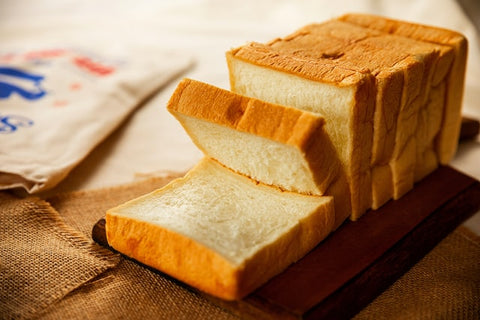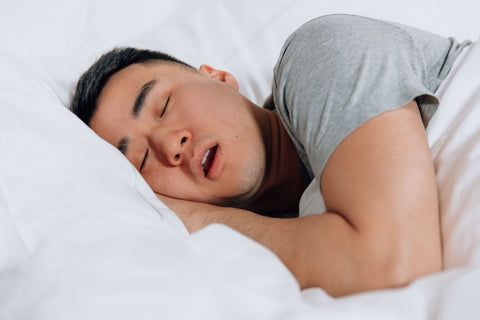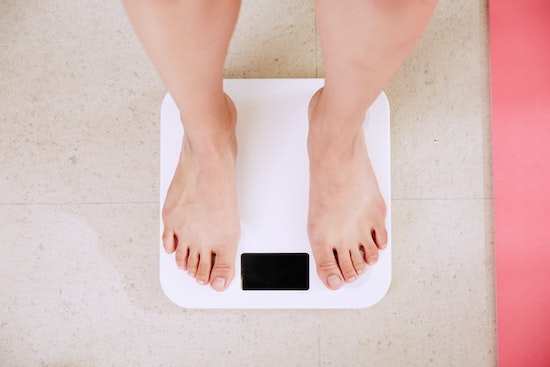Having a hard time falling and staying asleep can negatively affect your waistline. Sleep deprivation puts you at a higher risk than usual for obesity.
If obesity and sleep deprivation are connected, it makes sense that losing extra weight may help you fall and stay asleep easier over time.
However, sometimes making the effort to shed those extra inches can disrupt sleep even further.
Annoying, right? Despite your best efforts to improve your health, you’re left with a sleepless night.
Here’s why your weight loss journey may be keeping you up at night (and what you can do to fix it).
Calories In, Calories Out…Along With Sleep?
If you’re overweight, putting in the work to improve your health has huge benefits.
In fact, losing just five percent of your body weight is proven to lower your chances of developing cancer, diabetes, and high blood pressure.
But when making healthier choices starts to hinder our sleep, what can we do to remedy the issue? And why does it happen to begin with?

Each of us has a total daily energy expenditure (or TDEE). This is the number of calories we burn by default, without any added activity, based on our specific height and weight.
As you already know, placing your body in a caloric deficit by expending more energy through exercise and/or eating fewer calories than you’d need to maintain your current body weight leads to weight loss.
That said, long-term dieting, making changes to your meal schedule, or making extreme changes to your lifestyle can all disrupt your circadian rhythm or sleep-wake cycle.
Hunger also causes sleep disturbances.
Research shows that significant calorie reduction in overweight people increases the amount of time it takes for the onset of sleep as well as the amount of deep sleep we get each night.

However, reducing calories in smaller amounts may have positive effects on sleep quality, sleep duration, and general health.
Therefore, we can conclude that placing the body in too large of a caloric deficit too quickly is where the problem may lie.
Calorie deficit insomnia describes insomnia related to placing your body in too high of a deficit too quickly.
Calorie Deficit Insomnia: It’s Real!
You may think that we burn most of our calories during waking hours or pushing it hard in the gym.
In reality, we also burn calories while we sleep. We need extra energy to make the essential repairs to our bodies and minds during restorative rest.
Calorie deficit insomnia is real. Without proper nutrition, we can’t get proper sleep without waking up often throughout the night.
Diet culture feeds into this problem. You may have heard that eating dinner past a certain hour in the evening is bad.

The theory here is that ending your final meal of the day earlier rather than later may help to give the digestive system a rest overnight.
Furthermore, many believe that straying away from a late evening meal may help reduce overall calorie intake, helping you to lose weight even easier.
While there is some truth to these theories, going to bed hungry means that you won’t have the proper energy to sleep through the mental and physical processes your body has to complete during rest.
As a result, you’ll wake up groggy and drained due to an improper night’s sleep. So what should you do? Is pushing dinner to a later hour best?
Probably not. The answer may lie in upping your protein throughout the day.
A pair of controlled studies suggest that increasing your protein significantly improves sleep quality.
Findings show that the best sleep quality is achieved when protein makes up around 20 percent of our caloric intake.

The source of the protein didn’t seem to matter, as long as the subjects remained in a caloric deficit and kept within a high protein intake.
By studying your macronutrient needs, you can determine the proper amount of carbohydrates, protein, and fats you need within your specific deficit to meet this goal.
Exercise also plays a role, as exercising too hard too late in the evening hinders your sleep routine.
Are You Exercising Too Late?
Working out is a huge component of health. Even light exercise, like a leisurely stroll, has been shown to lower the risk of heart disease.
Nonetheless, working out too hard or too late in the day is known to cause insomnia.
Moderate exercise may burn more calories and help increase stamina, but intense exercise is proven to lead to more sleep trouble.

On top of that, exercising within an hour or two of bedtime is more likely to cause issues with sleep. Why?
These are both associated with changes in hormone levels and body temperature that may mess with sleep.
Additionally, exercise is a type of shock to the body that may cause sleep disturbances.
Exerting yourself at an extreme level is physically demanding, boosting stress hormones cortisol and adrenaline, making falling or staying asleep harder than usual.
@somnifix Reply to @somnifix Fact or 🧢: your #fitnessroutine causes #insomnia ⁉️🏋️ #FactOrCap #workoutroutine #sleep #didyouknow #weirdfacts ♬ About Damn Time - Lizzo
If you haven’t eaten enough or you’ve worked out too hard, adrenaline may peak at around 1 or 2 a.m. rather than earlier in the day. If you’ve already fallen asleep, this will wake you up from your slumber.
If you can’t fall asleep, this fluctuation will keep you tossing and turning, constantly moving, and stuck awake well into the middle of the night.
Nightmares, night sweats, and restlessness may accompany these symptoms. Adjusting your exercise time to an earlier point in the day may help.
We’ve already covered how theamount you eat may affect sleep, but what about whatyou eat?
Insomnia-Causing Foods
Caffeine, sugar, and alcohol are all well-known for keeping us from getting quality sleep.
If you’re already focused on weight loss, chances are that you may already be cutting back on things like sugar and alcohol.
That said, you may be consuming more caffeine than usual to suppress hunger or keep energy levels up. If you’re consuming too much, it has disastrous effects on sleep.

Caffeine is known to stay in the body for up to 24 hours. For that reason, it may be best to avoid consuming caffeine after lunch.
Moreover, it’s important to be mindful of foods and beverages that are secret caffeine sources, like chocolate, green tea, or tiramisu.
Furthermore, you may suffer from a micronutrient deficiency that’s keeping you from getting shut-eye. If you’re not getting enough vitamin B1, folate, or magnesium, insomnia may follow.
A diet high in refined carbs also increases your risk for poor sleep and insomnia, based on findings from a 2019 study.
These types of carbs are thought of as empty calories, containing little to no nutritional value. Examples include soda, white bread, cake, or certain kinds of pasta.

Highly refined carbs rapidly spike blood sugar, causing a crash later on. These persistent peaks and valleys are known for triggering insomnia.
Conversely, foods that raise blood sugar at a slower, more consistent level, like fruits, nuts, and beans, may help level out this problem.
Since you’ve read that refined carbs equal a restless night, you may be ready to cut them out altogether. Don’t get ahead of yourself.
Eating too low of an intake of carbs is also found to disrupt sleep.
Low Carb? Low Sleep
While low-carb diets limit refined carbs, they also cut out complex carbs found in grains, starchy veggies, and some fruits.
Many find this type of diet helpful since it is thought to help the body burn fat for energy rather than glycogen, helping aid weight loss.
Unfortunately, pushing your carb intake too low may keep you up each night, even though it helps lower the number on the scale.
Studies show that getting less than 50 percent of your daily caloric requirement from carbs is tied to poor sleep in men.

With carb consumption, amino acids in the brain rise and tryptophan converts over to serotonin. This is necessary for melatonin production.
When your body is running on high levels of protein instead of carbs, tyrosine rises instead, leading to the production of adrenaline and norepinephrine. As a result, the body kicks into overdrive, keeping you staring at the ceiling.
So what’s the solution? Like most things in life, balance is key. As we discussed earlier, if your protein intake is too low, sleep suffers. Too high, you’ll have the same problem.
The same is true for carbohydrates. Lowering your intake of refined carbs may improve sleep, but don’t be too quick to cut out complex sources of carbohydrates that may help you drift off with ease.
Lastly, your sleep disturbances could be an entirely separate issue from your weight loss efforts altogether: your airway health.
It May Not Be Connected to Your Waistline
Maybe you’ve ruled out calorie deficit insomnia by decreasing calories less aggressively. You’ve cut back on late-night exercising and you’re avoiding insomnia-causing foods.
What now? The solution may not be tied to your weight loss journey at all.
Mouth breathing at night is tied to snoring, sleep disorders, and grogginess in the morning. No big deal, right? You may think, “I can just focus on keeping my mouth shut.”

In truth, your mouth falls open during sleep for a variety of reasons, but largely because you’re unconscious. As airway muscles relax, the mouth falls open.
Tissues in and around the airway fall backward, causing snoring. Left untreated, this may cause sleep apnea, which could throw a wrench in your weight loss efforts even more.
Just like your trusty gym equipment, free weights, or favorite workout attire, mouth tape is an accessory that helps you work toward the life you desire and improve your health.
It sounds crazy and gimmicky, we know! But research shows that nasal breathing over mouth breathing calms the nervous system, activating our parasympathetic response.
This helps the body rest, digest, and relax.

SomniFix Mouth Strips are safe for all skin types, helping to create a proper lip seal without any extra work on your part.
Let our strips do the heavy lifting for your while you’re at rest!



